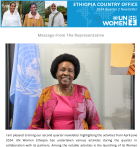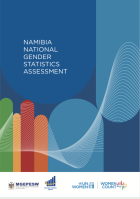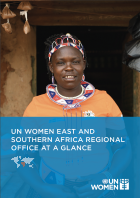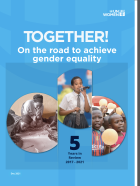1 - 13 of 13 Results
Date:
Discover the key insights and milestones of the Beijing Declaration and Platform for Action (BPfA) as we approach its 30th anniversary in 2025. This publication explores progress made, persistent challenges, and Kenya’s contributions to gender equality. Highlighting actionable steps for individuals and organizations, it connects the BPfA to the Sustainable Development Goals, emphasizing its continued relevance in driving transformative change for women and girls globally.
Date:
UN Women Ethiopia has undertaken various activities during the quarter in collaboration with its partners. Among the notable activities is the launching of its WomenEconomic Empowerment Strategy. The strategy encapsulates UN Women’s vision of empowering women to thrive and economies to prosper. It aims to dismantle the systemic barriers that prevent women from fully participating in the economy.
Another important work done during the quarter is the continuation of our effort to ensure the participation of Civil Society organizations in the transitional justice processes. To this end, a two-day national workshop on creating space for the CSOs to participate in the implementation process of transitional justice policy in Ethiopia was held in June 2024. The workshop targets women leaders from non-governmental and CSOs and representatives of grassroots community groups aimed to assess gender sensitivity of the Transitional Justice (TJ) Policy recently adopted by Ethiopia’s Council of Ministers.
Date:
This survey analyses what form of publications are being sought by diverse audiences and how often the publications are consulted by the audiences. It further mapped which parties seek UN Women publications in the region and in what format they preferred.
Date:
This brief emerges from the UN Women East and Southern Africa Knowledge Management Strategy 2022-2025. In the period of the Strategic Note (2018-2021), ESARO leveraged its knowledge management (KM) strategy (2018-2021) and developed KM tools and systems and ensured a systematic approach to KM implementation across the region.
Date:
This Report presents the Africa Shared Research Agenda (ASRA) for ending gender-based violence (GBV), which was developed though a collaboration between UN Women Africa and the Sexual Violence Research Initiative. The ASRA is a set of research priorities for the field, developed through a participatory and consultative process and aims to inform investments in research over the coming 5-10 years for ending GBV in Central, East, Southern and West Africa.
Date:
The identification of gender data and capacity gaps in the national statistics system is one of the first steps that has to be executed when working towards the increased production and use of gender statistics in a country. This report summarizes the findings of such an assessment done in Nambia during 2022. The findings will be used to inform planning, resource allocation and programming towards the improvement of gender statistics in the country.
Date:
UN Women is the UN agency mandated to promote gender equality and empowerment of women. In the East and Southern Africa Region, the organization has a presence in 13 Countries (Burundi, Ethiopia, Kenya, Malawi, Mozambique, Multi/Country Offices South Africa, Rwanda, Somalia, South Sudan, Sudan, Tanzania, Uganda, Zimbabwe). In countries where there is no presence, UN Women collaborates with the resident coordinator's office to advance gender equality.
Date:
Uganda's NAP Ill WPS 2021 - 2025 aims at ensuring sustained peace and security through enhanced meaningful participation of women in peace and development processes. The NAP I provides a strategic framework, through the WPS agenda, to mainstream UNSCR 1325 into national development and peace strategies, with the focus on strengthening the effective roles of women in the achievement of long-lasting peace in Uganda (MGLSD, 2021). Specifically, Uganda's NAP Ill aims to: Prevent all forms of violence and promote peace within families, communities and the nation; Promote meaningful participation of women in leadership and governance at all levels; Strengthen the capacity of women to mitigate and prevent natural and human-made disasters; and strengthen the institutional and coordination mechanism for WPS agenda at all levels.
Date:
The five years in review publication captures the progress made from 2017 to 2021 across its different focus areas: Leadership and Political Participation, Women’s Economic Empowerment, Ending Violence Against Women, Data and Statistics, HIV/AIDS and the response to the unfolding crisis caused by the COVID-19 pandemic.
Date:
This brief gives an overview of the Gender Statistics programmes across East and Southern Africa.
Date:
The UN Women WCARO annual report aims to share information about the regional office's activities on women empowerment and gender equality in 2020. The said year has been a particularly difficult year around the world with the COVID-19 pandemic. In West and Central Africa (WCA), women and girls were particularly vulnerable to the crisis. To counter these burdens and build medium and long- term recovery measures, the UN Women WCA Regional Office successfully provided multi-faceted assistance...
Date:
The working paper and accompanying policy brief provide an analysis of the progress and gaps across the continent in promoting young women’s role in decision-making and political processes across Africa. The paper further proposes recommendations for consideration by AU and AU Member States including for gender-responsive COVID 19 response and recovery plans that guarantee the participation and integration of the voices of young women.
Date:
The policy paper assesses the state of Gender Based Violence (GBV) in Africa in the context of the COVID-19 pandemic. Informed by evidence from the five African Union (AU) regions, it outlines some of the initiatives implemented in AU Member States. The paper also proposes recommendations towards multi-sectoral response and recovery efforts that address GBV as well as the related needs of women and girls in Africa.













